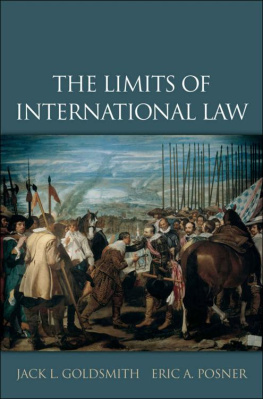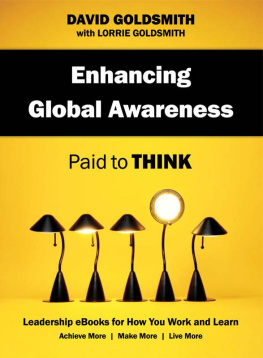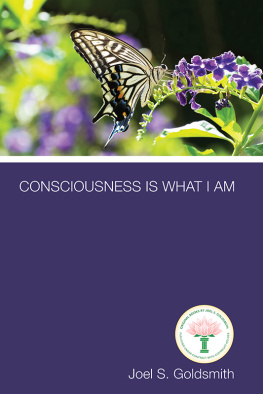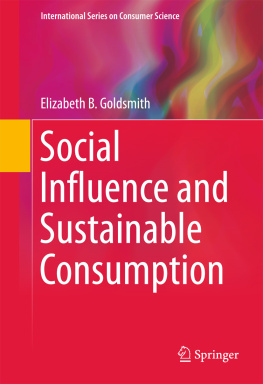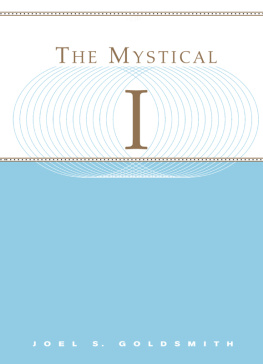Jack L. Goldsmith - The Limits of International Law
Here you can read online Jack L. Goldsmith - The Limits of International Law full text of the book (entire story) in english for free. Download pdf and epub, get meaning, cover and reviews about this ebook. year: 2005, publisher: Oxford University Press, genre: Politics. Description of the work, (preface) as well as reviews are available. Best literature library LitArk.com created for fans of good reading and offers a wide selection of genres:
Romance novel
Science fiction
Adventure
Detective
Science
History
Home and family
Prose
Art
Politics
Computer
Non-fiction
Religion
Business
Children
Humor
Choose a favorite category and find really read worthwhile books. Enjoy immersion in the world of imagination, feel the emotions of the characters or learn something new for yourself, make an fascinating discovery.
- Book:The Limits of International Law
- Author:
- Publisher:Oxford University Press
- Genre:
- Year:2005
- Rating:5 / 5
- Favourites:Add to favourites
- Your mark:
- 100
- 1
- 2
- 3
- 4
- 5
The Limits of International Law: summary, description and annotation
We offer to read an annotation, description, summary or preface (depends on what the author of the book "The Limits of International Law" wrote himself). If you haven't found the necessary information about the book — write in the comments, we will try to find it.
The Limits of International Law — read online for free the complete book (whole text) full work
Below is the text of the book, divided by pages. System saving the place of the last page read, allows you to conveniently read the book "The Limits of International Law" online for free, without having to search again every time where you left off. Put a bookmark, and you can go to the page where you finished reading at any time.
Font size:
Interval:
Bookmark:
THE LIMITS of INTERNATIONAL LAW
JACK L. GOLDSMITH
AND
ERIC A. POSNER


Oxford New York
Auckland Bangkok Buenos Aires Cape Town Chennai
Dar es Salaam Delhi Hong Kong Istanbul Karachi Kolkata
Kuala Lumpur Madrid Melbourne Mexico City Mumbai Nairobi
So Paulo Shanghai Taipei Tokyo Toronto
Copyright 2005 by Oxford University Press, Inc.
Published by Oxford University Press, Inc.
198 Madison Avenue, New York, New York 10016
www.oup.com
Oxford is a registered trademark of Oxford University Press
All rights reserved. No part of this publication may be reproduced,
stored in a retrieval system, or transmitted, in any form or by any means,
electronic, mechanical, photocopying, recording, or otherwise,
without the prior permission of Oxford University Press.
Library of Congress Cataloging-in-Publication Data
Goldsmith, Jack L.
The limits of international law / Jack L. Goldsmith, Eric A. Posner.
p. cm.
ISBN-13 978-0-19-516839-6
ISBN 0-19-516839-9
1. International lawPhilosophy. 2. International lawMoral and ethical aspects.
I. Posner, Eric A. II. Title.
KZ3160.P67A38 2005
341.01dc22 2004008190
1 3 5 7 9 8 6 4 2
Printed in the United States of America
on acid-free paper
FOR LESLIE AND EMLYN
THE LIMITS of INTERNATIONAL LAW
International law has long been burdened with the charge that it is not really law. This misleading claim is premised on some undeniable but misunderstood facts about international law: that it lacks a centralized or effective legislature, executive, or judiciary; that it favors powerful over weak states; that it often simply mirrors extant international behavior; and that it is sometimes violated with impunity. International law scholarship, dominated for decades by an improbable combination of doctrinalism and idealism, has done little to account for these characteristics of international law. And it has made little progress in explaining how international law works in practice: how it originates and changes; how it affects behavior among very differently endowed states; when and why states act consistently with it; and why it plays such an important role in the rhetoric of international relations.
This book seeks to answer these and many other related questions. It seeks to explain how international law works by integrating the study of international law with the realities of international politics. Our theory gives pride of place to two elements of international politics usually neglected or discounted by international law scholars: state power and state interest. And it uses a methodological tool infrequently used in international law scholarship, rational choice theory, to analyze these factors. Put briefly, our theory is that international law emerges from states acting rationally to maximize their interests, given their perceptions of the interests of other states and the distribution of state power. We are not the first to invoke the idea of state interest to explain the rules of international law (Oppenheim 1912). But too often this idea is invoked in a vague and conclusory fashion. Our aim is to integrate the notion of state interest with simple rational choice models in order to offer a comprehensive theory of international law. We also draw normative lessons from our analysis.
This introduction discusses the assumptions of our analysis, sketches our theory in very general terms, and locates our position among the various schools of international law and international relations scholarship.
The assumption that states act rationally to further their interests is not self-evident. All components of this assumptionthat the state is the relevant agent, that a state has an identifiable interest, and that states act rationally to further these interestsare open to question. Nonetheless, we believe state-centered rational choice theory, used properly, is a valuable method for understanding international law. What follows is a brief discussion of our use of the concepts of state, state interest, and rationality. Further detail is provided in subsequent chapters.
The existence of a state depends on the psychology of its citizens. If all U.S. citizens stopped believing that the United States was a state, and instead began to believe that they were citizens of Indiana or Texas or some other subunit, then the United States would cease to exist and numerous new states would come into existence. (This is in effect what happened when the Soviet Union and Yugoslavia disintegrated in the 1990s.) Moreover, the state is an abstraction. Although the identity of the state is intuitively clear, the distinction between the state and the influences on it sometimes blurs. Relatedly, the state itself does not act except in a metaphorical sense. Individual leaders negotiate treaties and decide whether to comply with or breach them. Because the existence of a state and state action ultimately depend on individuals beliefs and actions, one could reject the assumption that states have agency and insist that any theory about the behavior of states must have microfoundations in a theory of individual choice.
Despite these considerations, we give the state the starring role in our drama. The main reason for doing so is that international law addresses itself to states and, for the most part, not to individuals or other entities such as governments. NAFTA did not confer international legal obligations on President Clinton or the Clinton administration, but rather on the United States. The United States remains bound by these obligations until a future government withdraws the United States from the treaty. Moreover, although states are collectivities, they arrange themselves to act like agents, just as corporations do. Corporations are generally easier to understand than states. Corporate intereststo make money for the shareholders, subject to agency costs resulting from the delegation of authority to individuals who run the firmare (usually) easier to identify. And it is easier to assume that corporate obligations remain in force despite the turnover of managers, directors, and shareholders because the obligations are enforced by domestic courts regardless of who happens to be in control of the corporation. Still, state interests can be identified (as we explain later), and through various domestic institutions states can and do maintain their corporate identity. Both ordinary language and history suggest that states have agency and thus can be said to make decisions and act on the basis of identifiable goals.
The placement of the state at the center of analysis necessarily limits the scope of analysis. We do not discuss, except in passing, difficult and important topics at the margins of international law about how states form and disintegrate. Many scholars view European Union integration as a possible model for a more ambitious public international law. Although the EU project is in some respects constituted by international law, we think it is more usefully viewed as an example of multistate unification akin to pre-twentieth-century unification efforts in the United States (which, during its Articles of Confederation period, was viewed by some as a federation governed by international law), Germany, and Italy. In any event, we offer no theory of state unification or integration. Nor (except briefly in s analysis of human rights) do we have much to say about the opposite claim that the state is losing power downward to smaller state units (for example, the disintegration of the Soviet Union and the former Yugoslavia), to substate units (for example, the devolution movements throughout Europe), and to multinational corporations and transnational NGOs.
Next pageFont size:
Interval:
Bookmark:
Similar books «The Limits of International Law»
Look at similar books to The Limits of International Law. We have selected literature similar in name and meaning in the hope of providing readers with more options to find new, interesting, not yet read works.
Discussion, reviews of the book The Limits of International Law and just readers' own opinions. Leave your comments, write what you think about the work, its meaning or the main characters. Specify what exactly you liked and what you didn't like, and why you think so.

